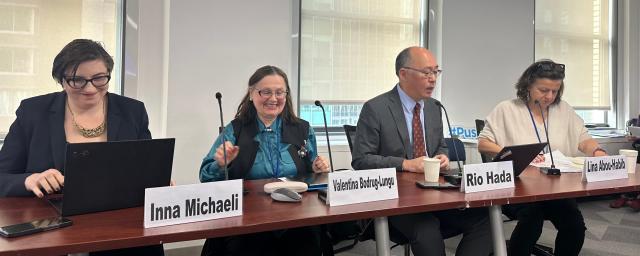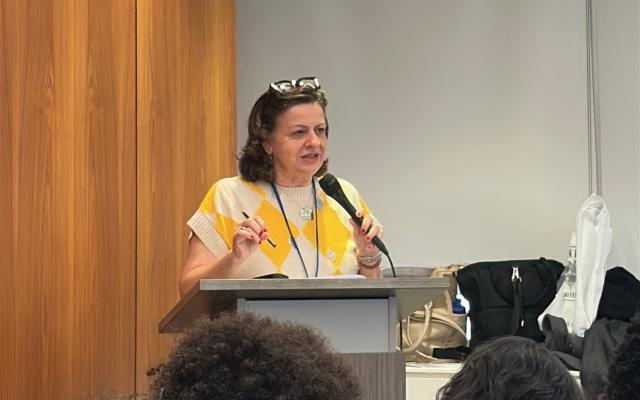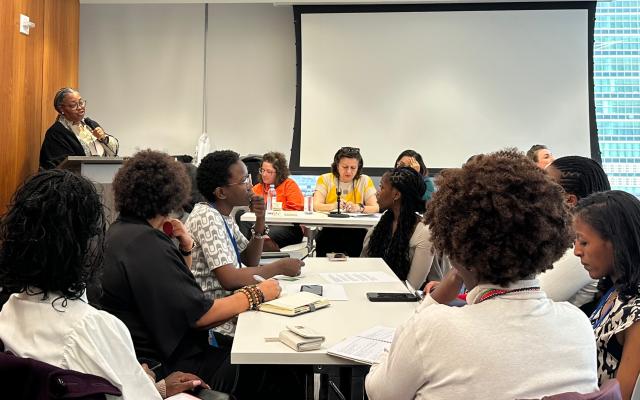
Photo courtesy of Asfari Institute
Thirty years after the landmark Beijing Conference on Women, feminists continue to wrestle with the promise and the pitfalls of multilateral spaces. These arenas - once claimed as sites of global solidarity, feminist agenda-setting, and bold visioning have increasingly become battlegrounds with anti-rights forces determined to silence, erase, and co-opt. Yet, as Lina Abou-Habib reflects in this blog, the story of feminist engagement in multilateralism is not only one of resistance, but also of persistence, creativity, and collective power. It is a story of refusing to retreat, of carrying forward the spirit of Beijing, and of reimagining what it means to fight for equality in spaces designed to exclude us.

Photo courtesy of Asfari Institute
Stepping into Uneasy Spaces: My Feminist Awakening on the Road to Beijing
My feminist awakening was a process of discovery, questioning, and connecting. It began in the late eighties when I became totally independent and economically self-sufficient. It was an intense learning period but also risk-fraught, as the war in Lebanon was raging and lawlessness was the norm.
It was also when I joined the Oxfam office in Lebanon. I had no formal degree in gender studies, and I had read and knew of a few of the famous feminists. I knew firsthand that being a woman and a girl in our societies was difficult and oftentimes cruel. My experience, and that of peers around me, was that of subjugation, silencing, and almost complete disrespect of wishes, ambitions, and aspirations. This was further compounded by war, economic challenges, and a religious schooling system whose main aim was to thwart free thinking.
In 1988, Oxfam in Lebanon had made an explicit decision to support disabled-led social movements and move away from the institutionalization model. I was tasked with doing an evaluation of Oxfam’s work with disability groups in Lebanon and identifying impact, transformative potential, actors and leaders, and the experience of persons with disabilities to organize and mobilize. This initial task led me to the realization that what was more challenging and oppressive than being a woman was actually being a woman with a disability.
The disability movement in Lebanon to me was avant-garde and progressive but was also extremely patriarchal and exuded toxic and violent masculinity. This was my first hands-on understanding and engagement with intersectional forms of oppression and the deliberate erasure of the voices of women with disabilities in spaces that were supposed to empower and liberate.
Throughout that period, and in the years that followed, I continued to be an active part of a process that sought to resource local and community-led social movements whilst facilitating connections, learning, and the building of grassroots leadership. None of this work involved engaging in multilateral spaces until the civil war in Lebanon came to an end and many of us began engaging proactively with broader global horizons, be it South-South or South-North.
This coincided with the preparations for the UN IV Conference on Women, set to take place in Beijing in September 1995. The preparations for what was to become a global landmark event involved regional conferences which brought together civil society organizations (women’s rights groups and others), government representatives, and international organizations as multilaterals.
I stepped reluctantly into the Arab States conference, which took place in Amman in November 1994, with very few expectations. Our five-star hotel in Amman was not a space that was comfortable for feminist activists, nor was the overwhelming presence of government officials and several large, well-resourced, and very vocal faith-based organisations. Within this rather oppressive dynamic, and what seemed like a very non-transparent and poorly participatory way of drafting the conference outcome document and the deliberate silencing of women’s voices from the region, progressive feminists from the Maghreb stood out.
Feminists from Algeria, Morocco, and Tunisia had been far more clairvoyant and had collectively formed, in the early nineties, the *Collectif Maghreb Égalité 1995*. The network was solely dedicated to action research and evidence-based campaigning for gender equality locally, regionally, and leading up to the Beijing conference in 1995. This was a key learning spike for me, as I was able to observe and then engage directly with a group of feminist activists from the region who joined forces to reclaim multilateral spaces and to bring in their agenda for gender equality.

Photo courtesy of Asfari Institute
Beijing’s Legacy: Feminist Solidarity in the Face of Backlash
The lead-up to the Beijing Conference in 1995 was instrumental in shaping the conference. The preparatory process created a space for collaborations, alliance-building, crafting and drafting of joint (and hence more powerful) demands, and joining forces to challenge conservative forces, groups, and governments. The demands of women’s rights and feminist groups from the MENA region varied, but action to stop violence against women, reform of family laws, and enhancing women’s political participation stood out as major demands.
I am proud and grateful to have contributed to facilitating the access of many MENA feminist activists to the Beijing conference, including providing support for multiple convenings, knowledge production, communication, and networking activities. I now see this as a critical contribution to ensuring that feminists meaningfully claim, occupy, and shape vital multilateral spaces.
For me the discovery of, and subsequent engagement in, multilateralism was through the window of opportunity provided by the period leading to the Beijing conference and the subsequent milestones. The next step was scoping the nature and potential of the Commission on the Status of Women (UNCSW) and what it represented and offered as a space for accountability, global solidarity, and engagement
The CSW was also a powerful experience of what the global backlash and anti-rights movement looked like. Many of us struggled within this space in challenging the conservative agendas of our own governments and the ways in which they were negatively influencing the space, in addition to the well-coordinated and organized hordes of anti-rights movements whose agenda is to claim the CSW and overpower feminist spaces.
As we organized parallel events during the CSW convenings, we were often attacked in various ways and forms by organized anti-rights groups who used various tactics including coming in groups, chanting slogans, throwing accusations, and using verbal and physical intimidation. These groups have been further empowered, first by forming what is now known as CSW-Families (or the anti-thesis of the CSW), and second by the rise of regressive political agendas around the globe, including in the USA.
Reminiscing, Resisting, Reclaiming: Feminist Lessons from Multilateral Spaces
As I reflect on my journey of feminist engagement with key multilateral spaces and why many emerging feminist groups from our region choosing to dissociate from them, these are some of my key learnings:
- Multilateral spaces may have meant different possibilities for different generations of feminist activists. In my case, it has been a space for connecting, learning, and fighting.
- Anti-rights movements, whether state or non-state actors, have always tried to take over and neutralize multilateral spaces. We have seen firsthand how many resources they have put in to control these spaces, to no avail, as they continue to face pushback from global feminist alliances.
- The most impactful strategies have been the resourcing of feminist activists to enable them to be in these spaces, influence them, and use them to connect and collectively mobilize.
- The active and well-prepared presence and participation of feminist activists have moved the needle in expanding definitions, bringing in an intersectional lens, and ensuring the substantive inclusion of all women and girls in their diversity.
- Perhaps the most important learning is that multilateral spaces are not homogeneous, and while they are sources of frustration and diluted statements, there are also powerful allies to be found.
In March 2025, as we gathered around discussions and activities to reflect on where we are 30 years after Beijing, I, wondered about the insistence of the global anti-rights movement to take over the space, sanitize language, and silence feminists. Thirty years after Beijing, and 50 years after Mexico (UN first world conference on women, 1975), the global feminist struggle remains as critical as ever in reclaiming these spaces we were instrumental in creating.

Lina Abou-Habib is the Director at Asfari Institute for Civic Society and Citizenship at the American University of Beirut.